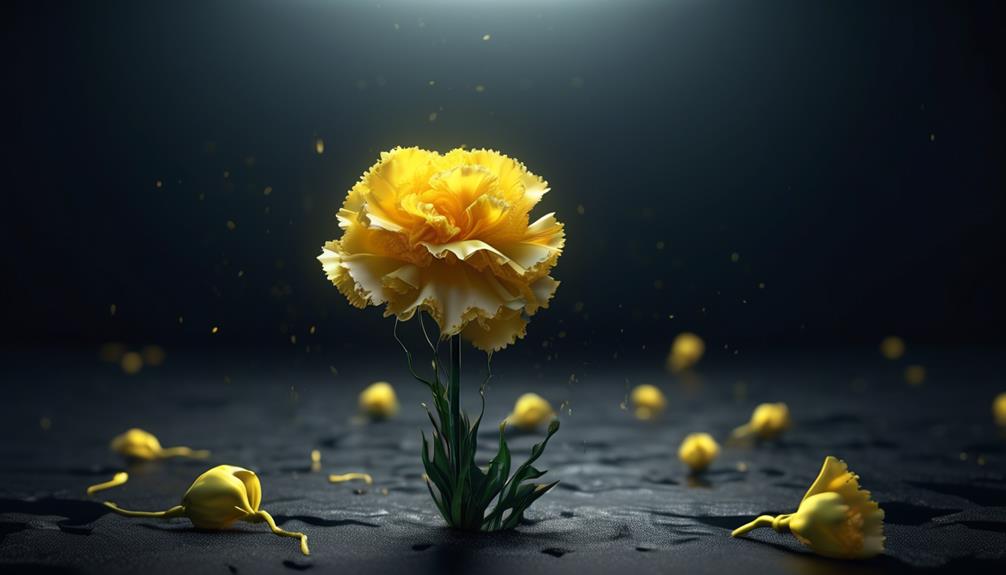You may be thinking that flowers are always a symbol of joy and affection, but when it comes to yellow carnations, the story takes a different turn. While other carnation colors are associated with love and admiration, the yellow ones carry a deeper message of disappointment or rejection.
In this discussion, we will explore the historical significance, emotional connotations, and occasions where yellow carnations play a role.
So, why do yellow carnations hold such contrasting meanings? Let's uncover the secrets behind this enigmatic flower and shed light on its intriguing symbolism.
Carnation's Historical Significance
The historical significance of carnations is marked by their use in Greek ceremonial crowns and their association with the tears of the Virgin Mary in Christian legend.
While yellow carnations are typically associated with disappointment and rejection, it's important to understand the broader historical context in which this flower has played a significant role.
In ancient Greece, carnations were used to create intricate crowns that were worn during ceremonial events, symbolizing honor and celebration. The delicate petals of the carnation were carefully woven together to create stunning displays of beauty and elegance.
In Christian legend, it's said that the tears of the Virgin Mary fell upon the earth and transformed into carnations, hence their association with her sorrow and compassion.
Despite their negative connotations in modern times, the historical significance of carnations can't be overlooked. These flowers have been used for centuries to convey emotions, tell stories, and add beauty to various occasions.
Story and Origins
Now let's explore the intriguing story and origins behind carnations. Carnations, also known as pinks, have a rich history and their name has several possible origins. One theory suggests that the name 'carnation' comes from the word 'coronation,' as the flowers were used in Greek ceremonial crowns. Another theory proposes that the name originated from the Latin word 'carnis,' meaning flesh, due to the flower's early association with pink hues. The scientific name of carnations, 'Dianthus caryophyllus,' may have derived from the myth of Diana, the goddess of the hunt, who was often associated with the flower.
To further understand the story and origins of carnations, let's take a look at the following table:
| Fact | Description |
|---|---|
| Name | Carnation |
| Possible Origins | Coronation, Carnis, Diana |
| Historical Significance | Used in Greek ceremonial crowns |
| Mythological Association | Linked to Diana, the goddess of the hunt |
As we delve into the history of carnations, we discover their connection to various cultural customs and legends. The story behind their name adds depth to the significance of these delicate blooms. Understanding the origins of carnations can help us appreciate the symbolism they hold, whether it be the light of disappointment or rejection associated with the yellow carnation or the vibrant hues that bring joy and beauty to our lives.
Emotional Connotations of Carnations
With their vibrant colors and varied meanings, carnations evoke a range of emotions and sentiments. Each color of carnation is associated with a specific emotional connotation, making them a popular choice for expressing feelings.
Red carnations, for instance, hold a deep meaning of love and admiration. They symbolize profound affection and can be used to convey strong emotions of love and devotion.
On the other hand, yellow carnations have a different emotional connotation. Unfortunately, they're associated with disappointment and rejection. The sight of a yellow carnation may bring tears to someone's eyes, as it signifies sadness and unrequited love.
This color of carnation is often given as a way of apologizing or as a gesture towards someone disliked. It's important to consider the emotional meanings behind different colors of carnations when choosing them as a gift, as they can convey powerful messages without the need for words.
Symbolic Meanings of Carnations
Symbolic meanings are attributed to different colors of carnations, making them a popular choice for conveying emotions and sentiments. Carnations, being a versatile flower, hold various symbolic meanings depending on their color. While red carnations represent love and admiration, pink carnations symbolize fondness and gratitude. White carnations convey purity and good luck, while purple carnations represent capriciousness and condolence. However, yellow carnations have a different connotation altogether. They're often associated with disappointment and rejection.
The symbolic meanings of yellow carnations can be quite disheartening. Traditionally, yellow carnations are considered suitable for gifting to someone you dislike or if you want to break up with someone. They convey a sense of disappointment and rejection. The light of a yellow carnation can cast a shadow of sadness and hurt, as it signifies the end of a relationship or the feeling of being let down.
It is important to recognize and understand the symbolic meanings of carnations, especially when choosing them as a gift. While they're a beautiful flower, their colors have deeper connotations that can convey emotions and sentiments. So, before presenting someone with a yellow carnation, it's crucial to be aware of the message it may send and consider the impact it may have on the recipient.
Caring for Yellow Carnations
To ensure the longevity and freshness of your yellow carnations, it's important to properly care for them. Start by finding a well-lit area for them, away from direct sunlight, as this can cause the petals to wither quickly. Changing the water every few days will also help to keep the carnations fresh. Additionally, be mindful of ethylene gas, which can shorten their lifespan. Keep your yellow carnations away from ripening fruits and vegetables to avoid exposure to this gas.
To further enhance their longevity, make sure the vase or container you use is clean and free from any bacteria that could cause premature wilting. Trim the stems at an angle and remove any excess foliage that may be submerged in the water, as this can help the flowers absorb nutrients better.
Occasions for Yellow Carnations
Yellow carnations are commonly given to express negative emotions or convey disappointment and rejection. While they may not be the most cheerful choice, there are specific occasions where a yellow carnation can be appropriate.
One such occasion is when you need to convey your feelings of disappointment or rejection to someone. For example, if you have been in a relationship and want to express your unhappiness or desire to end things, presenting a yellow carnation can serve as a subtle way to communicate your emotions.
Similarly, if you have to decline an invitation or reject someone's advances, a yellow carnation can help soften the blow. It's important to note that these flowers aren't typically used for joyous or celebratory events. So, if you're looking to express love or celebrate a happy occasion, it's best to choose a different flower.
However, for situations where conveying negative emotions or rejection is necessary, the yellow carnation can be a suitable choice.
Concluding Thought
What are the implications of giving someone a yellow carnation?
The yellow carnation holds the light of disappointment and rejection. It's a flower that conveys negative emotions and is suitable for expressing feelings of disappointment or rejection towards someone. When you choose to give someone a yellow carnation, you're sending a clear message of dissatisfaction or disapproval.
The symbolism behind the yellow carnation signifies regret and disappointment, making it an ideal choice to communicate negative sentiments. However, it's important to note that yellow carnations aren't typically associated with positive emotions, so if your intention is to convey happiness or love, it's best to opt for flowers of different colors such as red, pink, white, or purple. These colors are more commonly associated with positive sentiments and will effectively convey your desired emotions.
Frequently Asked Questions
What Does a Yellow Carnation Symbolize?
A yellow carnation symbolizes disappointment or rejection. If you receive one, it means someone isn't happy with you. It's like a slap in the face or a punch to the gut, leaving you feeling hurt and unwanted.
What Does a Carnation Mean in Negative?
In a negative context, a carnation represents disappointment or rejection. It is a symbol of regret or dislike towards someone. If you want to convey a sense of disappointment or break up with someone, giving a yellow carnation is suitable.
What Does Yellow Carnation Mean When Someone Dies?
When someone dies, giving a yellow carnation may be seen as insensitive or disrespectful, as yellow carnations symbolize disappointment and rejection. It's important to choose flowers that convey sympathy and support instead.
What Is the Metaphysical Meaning of the Carnation?
The metaphysical meaning of the carnation is diverse. Different colors hold different symbolism. For example, red represents love and admiration, while pink signifies tenderness. Yellow carnations convey disappointment and rejection.





